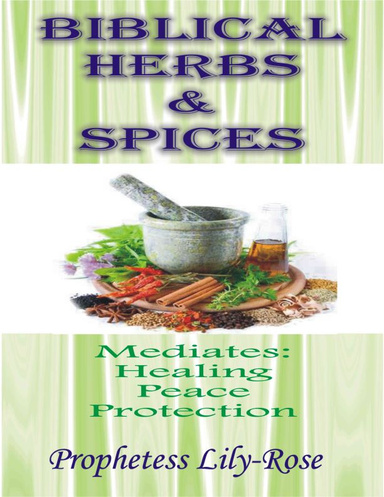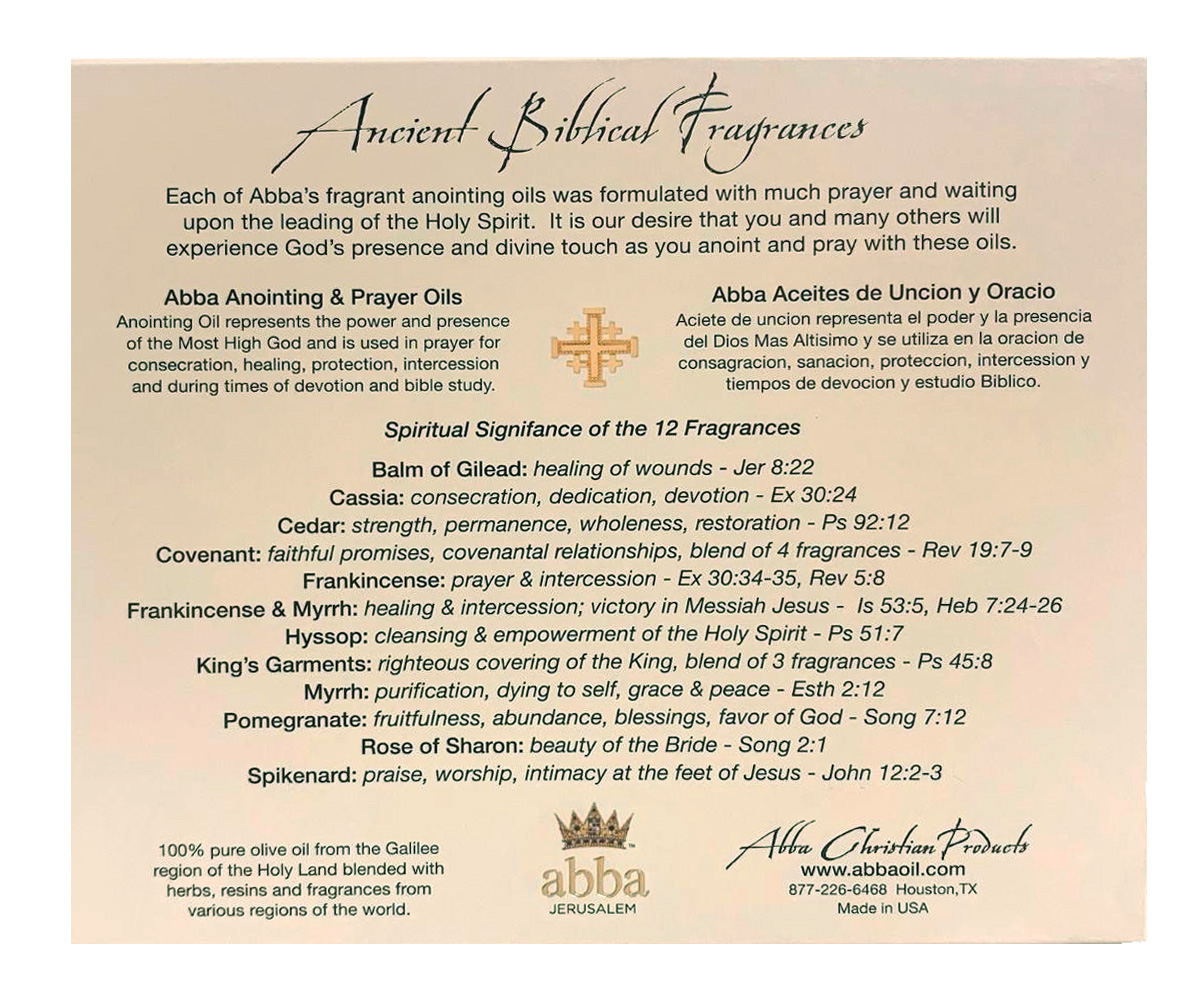Have you ever wondered about the ancient secrets hidden within the pages of the Bible? Imagine unlocking the power of nature’s own protection through the use of biblical herbs.
These remarkable plants, often mentioned in sacred texts, have been cherished for their protective and healing properties for centuries. As you delve into the fascinating world of biblical protection herbs, you’ll discover how these natural wonders can bring a sense of peace and security to your life.
Picture yourself harnessing the wisdom of ages, using these herbs to create a protective sanctuary in your home and heart. Ready to explore the mystical connection between faith and nature? Let’s dive into the captivating realm of biblical protection herbs and uncover the timeless benefits they hold for you.

Credit: www.lulu.com
Sacred Herbs In Biblical Times
Herbs played a big role in Bible times. People used them for healing and protection. Frankincense and myrrh were very special. These herbs were gifts for baby Jesus. Kings and priests valued them highly. They believed herbs could protect against evil. Hyssop was used to clean and purify. People would sprinkle it during holy rituals. Herbs were more than plants. They held deep meanings and stories.
Herbs connected people to their faith. Herbs were part of daily life and worship. They symbolized strength and safety. People saw them as gifts from God. Sage was burned to cleanse spaces. Mint was used in offerings. These practices showed respect and devotion. Families passed down these traditions. Many people believed in the power of herbs. They used them for both body and spirit.

Credit: store.jewsforjesus.org
Commonly Used Protection Herbs
Hyssop is a special herb known for its protection powers. People use it to ward off evil and keep them safe. It’s often found in ancient rituals. Hyssop has a fresh smell and grows easily. You can find it in gardens and local markets.
Frankincense is a resin from trees. It has been used for centuries. Many believe it cleanses spaces and brings peace. The smoke from burning it is calming. It is a popular choice in spiritual practices.
Myrrh is another resin with strong protective qualities. It has a rich history in medicine and rituals. People use it in incense and oils. Myrrh has a deep, warm scent. Many find it soothing and comforting.
Mint is a common herb with many uses. It has a fresh, lively scent. People believe it can repel negative energy. Mint is easy to grow at home. It is often used in teas and cooking.
Rituals And Practices
Incense burning is an ancient practice. Herbs like frankincense and myrrh are often used. These herbs create a fragrant smoke. Smoke purifies the air and surroundings. People believe it wards off bad energy. Incense brings peace and calmness. It’s often used in prayers and rituals.
Herbal anointing involves applying oils to the skin. Oils made from holy herbs are used. People anoint themselves for protection. This practice is seen in religious texts. Anointing helps in feeling safe and blessed. It is a symbol of divine care.
Purification ceremonies use herbs like sage and cedar. These herbs are burned or used in water. The goal is to cleanse the spirit and mind. Such ceremonies remove negative feelings. They are common in many cultures. People feel renewed and refreshed after.
Healing And Protective Properties
Antimicrobial Benefits: Biblical herbs fight germs. These herbs keep people healthy. They stop bad bacteria. They help the body stay strong. Garlic and thyme are examples. These herbs protect the body from sickness.
Spiritual Safeguarding: Herbs bring peace to the spirit. They protect against evil forces. Using herbs can make people feel safe. Sage and rosemary guard the soul. They help create a calm space. These herbs keep negative energy away.
Emotional Comfort: Herbs soothe the mind and heart. They help ease sadness. Lavender and chamomile calm feelings. They bring joy and peace. These herbs are natural healers. They help people feel better inside.
Modern Applications Of Ancient Herbs
Herbal remedies have been used for centuries. Ancient herbs like basil, mint, and thyme are popular. People use them for healing and soothing pains. These herbs can help with cold symptoms and stomach problems. They are natural and easy to find. Many families keep them at home. They are safe and have few side effects.
Essential oils come from plants. Lavender oil is famous for calming effects. Peppermint oil helps with headaches. People love eucalyptus oil for colds. These oils smell nice and are easy to use. You can add them to baths. Some people mix them with water. They can clean air and make spaces feel fresh.
Many families use herbs for home protection. Sage is common for cleansing spaces. Burning sage removes bad energy. Rosemary protects homes and brings luck. People hang garlic at doors to ward off evil. These practices are old but still popular. They are simple and easy to do. Many believe they keep homes safe.

Credit: tl.levhaolam.com
Reviving Ancient Wisdom
Ancient people used herbs for protection and healing. These herbs were part of their daily life. They believed in the power of nature. Herbs like hyssop and frankincense were common. These herbs had special meanings. People used them in ceremonies and rituals. They believed herbs kept bad things away.
Many cultures have traditions with herbs. These traditions are important. They keep stories and beliefs alive. Using these herbs connects us to our past. It also helps us remember our ancestors. Preserving these practices is like keeping a piece of history. When we use these herbs, we honor their wisdom.
Frequently Asked Questions
What Are Biblical Protection Herbs?
Biblical protection herbs are plants mentioned in the Bible with protective properties. They were used for spiritual and physical protection. Some common examples include hyssop, frankincense, and myrrh. These herbs were often used in rituals and ceremonies. They symbolized purification, healing, and divine protection in biblical times.
How Were Herbs Used In Biblical Times?
Herbs in biblical times were used for spiritual, medicinal, and culinary purposes. They played a significant role in religious rituals. People used them for purification and protection. They were also used as remedies for various ailments. Additionally, herbs enhanced the flavor of food, making them versatile and valuable.
Which Herbs Are Mentioned In The Bible?
The Bible mentions several herbs known for their protective and healing properties. Commonly mentioned herbs include hyssop, frankincense, myrrh, and cinnamon. These herbs were used in religious ceremonies and for medicinal purposes. They symbolized spiritual purity, healing, and divine protection, reflecting their significance in biblical culture.
What Is The Significance Of Hyssop In The Bible?
Hyssop holds significant spiritual symbolism in the Bible. It was used for purification and cleansing rituals. Mentioned in the Old Testament, hyssop symbolizes spiritual purification and redemption. Its use in Passover and other rituals highlights its importance. Hyssop represents the cleansing of sins and spiritual protection.
Conclusion
Biblical herbs offer protection and peace to believers. These ancient plants have stood the test of time. They hold spiritual and medicinal value. Many people still use them today. Faith and nature work together. This connection strengthens our spiritual journey.
Discover these herbs and their uses. Let them guide your path and bring comfort. Embrace their history and wisdom. Let these sacred plants inspire a deeper connection with your faith. Consider their power and presence in your life. You might find new strength and peace.
A simple, yet profound, gift from the past.
